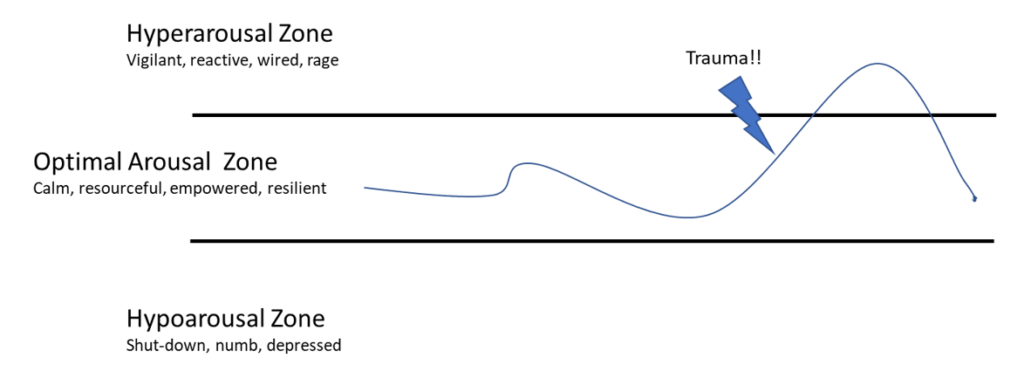I my last article I talked about how our brains and bodies respond to stress. Today I want to explore the goal of stress management which is achieving an optimal state of arousal in the middle of a threat.
As you can see from this diagram, the mind can be in optimal arousal (necessary to respond appropriately to a threat) or hyper or over arousal or even hypo or under-arousal.
Being either over aroused or under aroused will not only keep you from enjoying life, but also impede your ability to think clearly or respond effectively during stress. Therefore, I like to think that the goal of stress management is to put yourself into optimal arousal or a calm, resourceful, and empowered state from which to respond rather than simply react to the stressor. You want to be able to act from your “wise mind,” or I like to think of it as inner wisdom rather than being either over or under aroused.
Three States
The term wise mind comes from the field of Dialectical Behavioral Therapy, a set of techniques to treat various forms of distress as well as mental and personality disorders. Wise mind is based on the idea that the mind has three states: The emotional mind (or downstairs brain), the rational mind (or upstairs brain) and the wise mind which is a balance of the two. Although everyone possesses all three states of mind, most people gravitate towards one or the other most of the time.
The Emotional Mind
The emotional mind is when your downstairs mind dominates. Your responses to a situation are controlled by your emotions. Facts are distorted making logical thinking and planning difficult. You’re likely to act impulsively with little regard for the consequences.
Examples are getting into an argument with a loved one, snapping at a salesperson because they don’t have what you want, buying something you can’t really afford, or even deciding to watch movies on Net Flicks rather than getting down to work. How you feel is driving your behavior.
The Rational Mind
The rational mind is when you approach a situation intellectually, based solely on reason, not allowing your feelings to enter the equation. You have a non-emotional approach to solving problems.
Examples are sticking to the recipe and measuring each ingredient with exactness when baking a cake, looking up a bus schedule before walking to the bus stop, planning every detail of a vacation months in advance, studying for a test days early. The downside of operating from the rational mind is that you suppress your feelings in a way that you feel less joy, you fail to listen or trust your intuition, or you fail to have empathy for what others are going through.
The Wise Mind
The wise mind is the point of overlap or balance between the emotional and rational minds. You recognize and respect your feelings or intuition as an important source of input into your thought process but also balance your emotions with reason.
As the founder of Dialectical Behavior Therapy, Marsha Linehan, has said, the wise mind is “that part of each person…knows if something is true or valid. It is almost always quiet. It has a certain peace. It is where the person knows something in a centered way.”
In other words, the wise mind does not overreact emotionally, nor does it react based solely on reason but from a deeper, inner wisdom.
How to Experience the Wise Mind
Although everyone has access to their wise mind, it can be a challenge to get in touch with it, especially in the middle of a stressful situation. Some ways to experience it are to pause and step back from a situation before responding, to pay attention to your breathing, your inbreaths and outbreaths, to find a place of peace in your body such as the heart, belly, or center of the head or between your eyes. It is searching for the truth, deep down, rather than defending or justifying your behavior or point of view.
I share this with you because a goal of all the stress management techniques is to help you calm your mind and body enough to access your wise mind or inner wisdom. It doesn’t happen automatically. It takes practice to calm yourself when in the middle of stress, especially when the situation demands an immediate response. But I want to ask you to keep this goal in mind. You’re not just trying to solve a problem or deal with a situation. Your first order of business is getting in touch with your inner wisdom from which you can act in more helpful and effective ways.
Can you think of an experience in which you acted from your wise mind? You may have been inclined to react but took time to step back and respond from a more powerful place inside. What happened? How did you access your wise mind?



We are at the airport, feeling a little stress since our flight to NY is an hour and a half late. They tell us we will make our Lisbon flight however. Our emotions want to rule but our rational mind says Delta knows best – sit back and enjoy the ride
Good, practical example, Jim. So much of life is tapping into our rational mind and trusting ourselves to deal with the curve balls life throws our way.